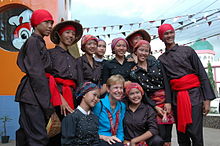This article relies largely or entirely on a single source. (May 2020) |
 Students from the Datu Bantilan Dance Troupe in traditional Yakan costume with US Ambassador Kristie Kenney. | |
| Total population | |
|---|---|
| 282,715 (2020 census)[1] | |
| Regions with significant populations | |
| Basilan, Zamboanga Peninsula | |
| Languages | |
| Yakan, Tausug, Zamboangueño Chavacano, Cebuano, Filipino, English, Malay | |
| Religion | |
| Predominantly Islam | |
| Related ethnic groups | |
| Sama-Bajau, other Muslim Filipinos, Lumad, Visayans, other Filipinos, other Austronesian peoples |
The Yakan people are among the major Filipino ethnolinguistic groups in the Sulu Archipelago. Having a significant number of followers of Islam, it is considered one of the 13 Muslim groups in the Philippines. The Yakans mainly reside in Basilan but are also in Zamboanga City. They speak a language known as Bissa Yakan, which has characteristics of both Sama-Bajau Sinama and Tausug (Jundam 1983: 7-8). It is written in the Malayan Arabic script, with adaptations to sounds not present in Arabic (Sherfan 1976).
The Yakan have a traditional horse culture. They are renowned for their weaving traditions.[2] Culturally, they are Sama people who eventually led a life on land, mostly in Basilan and Zamboanga city. They are included as part of the Sama ethnic group, which includes the Bajau, Dilaut, Kalibugan, and other Sama groups.[3]
- ^ "Ethnicity in the Philippines (2020 Census of Population and Housing)". Philippine Statistics Authority. Retrieved July 4, 2023.
- ^ de Jong, Ronald. "The last Tribes of Mindanao, the Yakan; Mountain Dwellers". ThingsAsian. Global Directions, Inc. Retrieved 16 November 2018.
- ^ Charles O. Frake (2006). Chapter 14. The Cultural Construction of Rank, Identity and Ethnic Origins in the Sulu Archipelago: compiled by James J. Fox and Clifford Sather (2006) in Origins, Ancestry and Alliance: Explorations in Austronesian Ethnography. ANU Press.